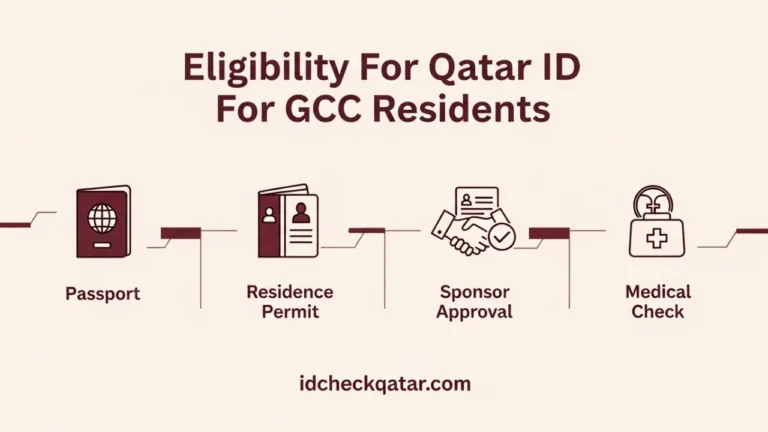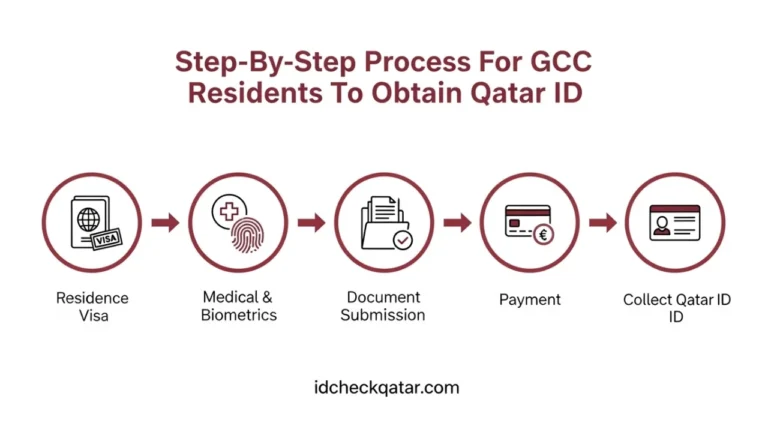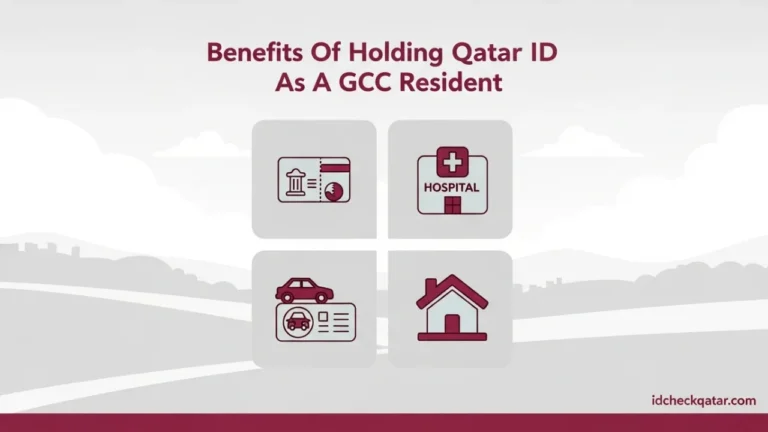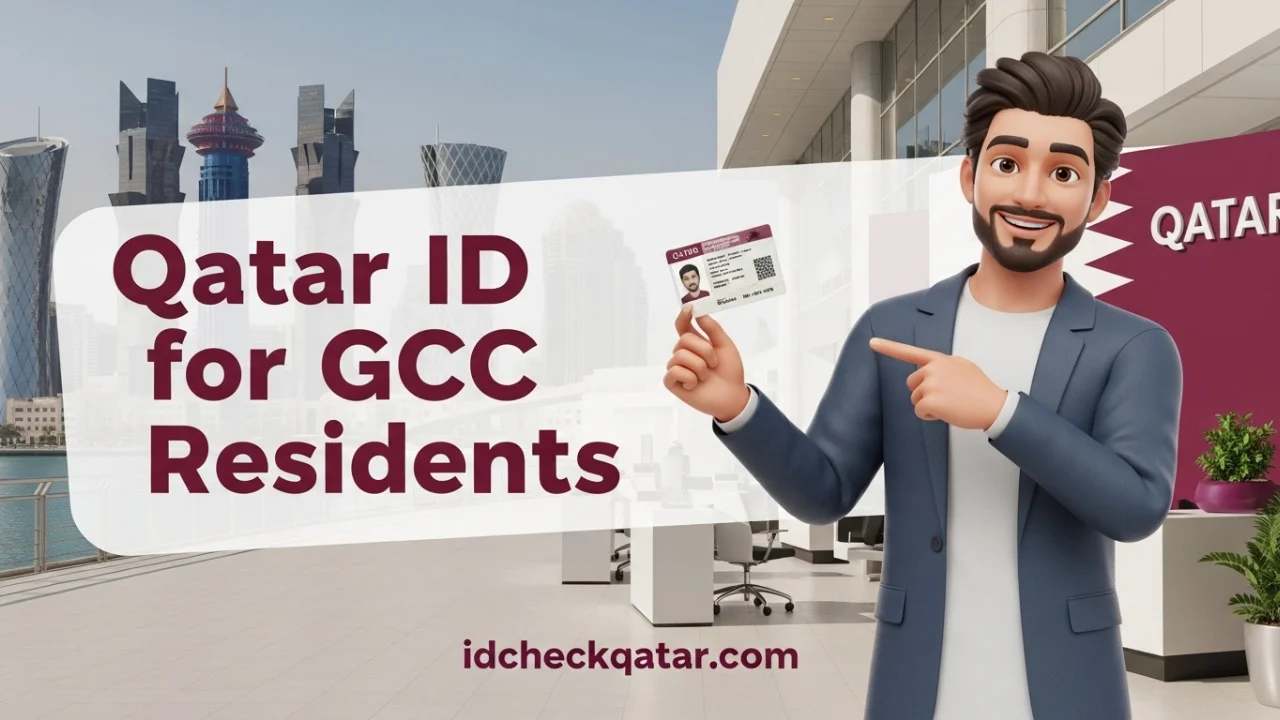Qatar ID for GCC Residents: Eligibility, Fees, Steps
The process for GCC residents to obtain a Qatar ID is essentially the same as for other expatriates: you must secure a valid residence permit from the Ministry of Interior Qatar (MOI), meet the required eligibility criteria, and complete the biometric and medical procedures. GCC residents cannot simply convert their home country resident permit into a Qatar ID without fulfilling the standard residency and ID card steps.
If you are living in a Gulf Cooperation Council (GCC) country and planning to move to Qatar, you may ask about the Qatar ID for GCC residents. This guide explains in simple terms the application process, eligibility rules, required documents, and benefits for GCC-resident expatriates. By the end of this article, you will understand how the Qatar ID system applies to GCC residents, what special considerations exist, and how to stay compliant with the MOI rules.
What Is The Qatar ID And Who Needs It
The Qatar ID is an official residence identity card issued by the Ministry of Interior that all expatriate residents must hold once they have a valid residence permit.
The QID (also known as the residency card) is the official identity document in Qatar. It shows your name, photo, nationality, sponsor, validity period, and a unique 11-digit number.
If you will be living in Qatar for more than a short stay, you will be required to obtain a QID. The same applies whether you are a GCC resident arriving in Qatar or coming directly from outside the Gulf region. The card is essential for accessing government services, opening bank accounts, getting a driver’s licence, and more.
For more details on general processes, check our guide on how to get Qatar ID in 2026.
Eligibility For Qatar ID For GCC Residents
GCC residents are treated as expatriates when applying for a Qatar ID, so you must hold a valid Qatar residence permit, meet the medical and biometric standards and be sponsored, just like other non-GCC expats.
If you are currently a resident of any GCC nation and plan to move to Qatar, your GCC-residence status does not automatically grant you a Qatar ID.
You must first obtain the Qatar residence permit under a sponsor (employer or family) and only then apply for the Qatar ID card through the MOI.
Eligibility criteria typically include:
- A valid Qatar residence visa (work, family, student, investor).
- Your stay in Qatar is longer than the initial entry/visit period.
- Sponsorship by a Qatari employer or family member.
- Completion of medical examination and biometrics (fingerprint/photo).

Special Considerations For GCC Residents
When a GCC-resident expatriate seeks a Qatar ID, be aware that your previous GCC permit does not replace the sponsor-residence requirement in Qatar, and you must ensure your job title, documents and visa status meet the MOI rules.
Here are key points and practical tips:
- Your GCC residence permit may help in a visa or entry application, but once in Qatar you still must be sponsored and hold a residence visa.
- There is no publicly announced “fast-track Qatar ID for GCC residents” scheme.
- Ensure that your profession is valid and acceptable for a Qatar residence visa. Many sources emphasise that for GCC-resident visa entry into Qatar, the profession must belong to approved categories.
- Documents: Passport must be valid (at least six months usually), and your GCC residence permit should have sufficient validity if used for a visa on arrival.
- Visit purpose: If you were only going to stay temporarily (via Qatar visa on arrival), that does not automatically convert into a full residence permit or QID.
- Once you apply for the actual Qatar ID, you must follow the same steps as any expatriate: medical check, biometrics, and sponsor submission.
- Limitations: Being a GCC-resident does not bypass the income, accommodation or sponsorship criteria for dependents.
These considerations mean that GCC residents should plan for full residency and ID when relocating to Qatar, not rely on any shortcut.
Step-by-Step Process For GCC Residents To Obtain Qatar ID
The process for obtaining the Qatar ID for GCC residents involves obtaining a residence visa, undergoing health & biometric screening, paying fees, submitting documents, and collecting your QID card after approval.
Step 1: Secure Qatar Residence Visa
You must enter Qatar under a work, family or investor residency permit. Your employer or sponsor must apply for a residence permit via the MOI. This step is mandatory before QID issuance.
Step 2: Pass Medical Examination & Biometrics
Once you receive your residence approval, you will undertake a medical test (blood, chest X-ray) and submit biometric data (fingerprint, photo). These are mandatory for all ID cards in Qatar.
Step 3: Submit Documents & Pay Fees
You must submit your passport copy, sponsor’s details, employment or family documents, and pay the ID issuance fee. The fee may vary depending on validity.
Step 4: Application Processing & Collect Card
The MOI processes the application, and once approved, you visit an MOI service centre to collect your physical QID card. At this stage, you become a legal resident with a full ID.
Step 5: Use & Maintain Your Qatar ID
Start using your QID for bank account setup, government services, health card linkage, etc. Make sure to renew on time and update any changed details (address, photo, etc).
Below is a simplified table comparing approximate timeline and fees (for general expatriates; GCC-resident process is similar):
| Step | Approximate Time | Typical Fee* |
|---|---|---|
| Residence visa issuance | 2-4 weeks | Varies by visa type |
| Medical & biometrics | 1-5 days | Included in sponsor costs |
| QID application & card issuance | 1-2 weeks after visa | Around QAR 500-900 depending on duration* |
| *Fees subject to change; check MOI for latest rates. |

Benefits Of Holding Qatar ID As A GCC Resident
Once you have your Qatar ID, you gain full residency status in Qatar, which allows access to banking, a driver’s licence, health care, and other services without being tied to just short-visit privileges.
The QID unlocks key advantages for GCC-resident expatriates relocating to Qatar:
- Legal proof of residence, enabling employment, family sponsorship, and government services.
- Ability to open local bank accounts, secure telecom connections, rent housing, and register children in schools.
- Access to UAE‐style smart services via the MOI portal and the Metrash 2 app.
- Integration as a long-term resident, rather than a short visit or transit status.
- Eligibility for other benefits such as linking your health card and renewing in-country without always exiting and re-entering.
Using the QID in everyday life removes many barriers that short-stay or visa-on-arrival residents face.

Common Mistakes GCC Residents Should Avoid
GCC-resident expatriates often assume their GCC permit or visit visa grants them an immediate Qatar ID, or they skip the biometric/medical steps; avoid these errors to ensure smooth processing.
Here are frequent pitfalls and how to avoid them:
- Assuming automatic eligibility: Having a GCC residence permit does not replace the requirement for a Qatar residence permit and QID. You must go through the formal steps.
- Incorrect profession category: If your job title isn’t among Qatar’s accepted categories, your residence visa or application may be rejected. Verify your job’s eligibility early.
- Delayed biometrics or medical tests: These must be completed promptly after visa approval to avoid delays.
- Ignoring renewal deadlines: Failing to renew the QID on time can lead to violations.
- Using the wrong internal link for information: For up-to-date guides and details you should refer to trusted resources like our main portal at idcheckqatar.com and the articles about renewing or checking QID.
Avoiding these mistakes will improve your application success and minimise stress.
FAQs – Qatar ID For GCC Residents
Conclusion
For GCC-resident expatriates looking to move to Qatar, obtaining the Qatar ID is a vital step for full legal integration and access to services. While your GCC residency status may help with travel or visa entry, it does not bypass the standard requirements for the QID. By securing a proper Qatar residence visa, completing the medical and biometric steps, and submitting the QID application to the MOI you ensure that you meet the regulatory standards. Remember to link your QID efforts with your longer-term plans in Qatar and use trusted resources—such as our detailed QID renewal guide and QID status check article, to keep your knowledge up to date.

